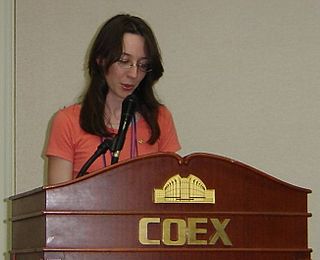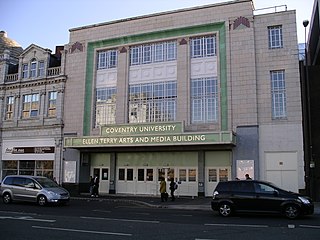Media studies is a discipline and field of study that deals with the content, history, and effects of various media; in particular, the mass media. Media Studies may draw on traditions from both the social sciences and the humanities, but mostly from its core disciplines of mass communication, communication, communication sciences, and communication studies.

Digital media means any communication media that operate with the use of any of various encoded machine-readable data formats. Digital media can be created, viewed, distributed, modified, listened to, and preserved on a digital electronics device. Digital can be defined as any data represented by a series of digits, while media refers to methods of broadcasting or communicating these information. Together, digital media refers to mediums of digitized information broadcast to us through a screen and/or a speaker. This also includes text, audio, video, and graphics that are transmitted over the internet for viewing or listening to on the internet.
Technological convergence, also known as digital convergence, is the tendency for technologies that were originally unrelated to become more closely integrated and even unified as they develop and advance. For example, watches, telephones, television, computers, and social media platforms began as separate and mostly unrelated technologies, but have converged in many ways into interrelated parts of a telecommunication and media industry, sharing common elements of digital electronics and software.
New media are forms of media that are computational and rely on computers for redistribution. Some examples of new media are computer animations, computer games, human-computer interfaces, interactive computer installations, websites, and virtual worlds.

Henry Jenkins III is an American media scholar and Provost Professor of Communication, Journalism, and Cinematic Arts, a joint professorship at the University of Southern California (USC) Annenberg School for Communication and Journalism and the USC School of Cinematic Arts. He also has a joint faculty appointment with the USC Rossier School of Education. Previously, Jenkins was the Peter de Florez Professor of Humanities as well as co-founder and co-director of the Comparative Media Studies program at the Massachusetts Institute of Technology (MIT). He has also served on the technical advisory board at ZeniMax Media, parent company of video game publisher Bethesda Softworks. In 2013, he was appointed to the board that selects the prestigious Peabody Award winners.

Citizen media is content produced by private citizens who are not professional journalists. Citizen journalism, participatory media and democratic media are related principles.
Video game culture is a worldwide new media subculture formed by video gamers. As video games have exponentially increased in popularity over time, they have had a significant influence on popular culture. Video game culture has also evolved with Internet culture and the increasing popularity of mobile games. Many people who play video games identify as gamers, which can mean anything from someone who enjoys games to someone passionate about it. As video games become more social with multiplayer and online capability, gamers find themselves in growing social networks. Playing video games can both be entertainment as well as competition, as the trend known as electronic sports has become more widely accepted.

Stuart Cunningham is Distinguished Emeritus Professor of Communication and Media Studies at QUT.
John Hartley,, FAHA,, ICA Fellow, an academic, is a John Curtin Distinguished Emeritus Professor. He was formerly Professor of Cultural Science and the Director of the Centre for Culture and Technology (CCAT) at Curtin University in Western Australia, and Professor of Journalism, Media and Cultural Studies at Cardiff University. He has published over twenty books about communication, journalism, media and cultural studies, many of which have been translated into other languages. Hartley continues with CCAT as an adjunct professor.
In mass communication, media are the communication outlets or tools used to store and deliver information or data. The term refers to components of the mass media communications industry, such as print media, publishing, the news media, photography, cinema, broadcasting, digital media, and advertising.
The School of Communication and Information (SC&I) is a professional school within the New Brunswick Campus of Rutgers, The State University of New Jersey. The school was created in 1982 as a result of a merger between the Graduate School of Library and Information Studies, the School of Communication Studies, and the Livingston Department of Urban Journalism. The school has about 2,500 students at the undergraduate, masters, and doctoral levels, and about 60 full-time faculty.
The study of global communication is an interdisciplinary field focusing on global communication, or the ways that people connect, share, relate and mobilize across geographic, political, economic, social and cultural divides. Global communication implies a transfer of knowledge and ideas from centers of power to peripheries and the imposition of a new intercultural hegemony by means of the "soft power" of global news and entertainment.
Jean Burgess is a Professor of Digital Media at the QUT Digital Media Research Centre, and in the QUT School of Communication. She is currently Associate Director of the ARC Centre of Excellence for Automated Decision-Making and Society. She was the Deputy Director of the former ARC Centre of Excellence for Creative Industries and Innovation (CCI) at the Queensland University of Technology. From 2010-2013 Jean was an Australian Research Council Postdoctoral Fellow (APD), working with Axel Bruns on the ARC Discovery Project 'New Media and Public Communication'. She researches and publishes on issues of cultural participation in new media contexts, with a particular focus on user-created content, online social networks, and co-creative media including digital storytelling.
Professor Gerard Goggin is an Australian media and communications researcher at the University of Sydney. He has produced award-winning research in disability and media policy alongside other contemporary works on digital technology and cultures.

The Department of Media was part of Coventry School of Art and Design in Coventry University but is now known as the School of Media and Performing Arts in the Faculty of Arts and Humanities. It is located within the Ellen Terry Building, which is a £7 million refurbished 1930s cinema in the centre of Coventry, UK.
The ARC Centre of Excellence for Creative Industries and Innovation (CCI) was an Australian research centre that undertook research in media studies, cultural studies, communication studies, law, education, economics, business technology, and information technology, related to the creative economy, between 2005 and 2013.
Tim Jordan is a professor at the University College London where he is also Head of the programme in Arts and Sciences (BASc). Prior to that, he worked at the University of Sussex, King's College London in culture, media and creative industries and digital humanities departments, and has previously worked as the head of the sociology department at the Open University. He has published his work on hacking and online cultures. He was co-founder of the journal Social Movement Studies.
Dal Yong Jin is a media studies scholar. He is Distinguished SFU Professor in the School of Communication at Simon Fraser University, Vancouver, Canada where his research explores digital platforms, digital games, media history, political economy of communication, globalization and trans-nationalization, the Korean Wave, and science journalism. He has published about 30 books and penned more than 200 journal articles, book chapters, and book reviews. Jin has delivered numerous keynote speeches, conference presentations, invited lectures, and media interviews on subjects such as digital platforms, video games, globalization, transnational culture, and the Korean Wave. Based on his academic performance, he was awarded the Outstanding Scholar Award from the Korean American Communication Association at the KACA 40th Anniversary Conference in 2018, while receiving the Outstanding Research Award from the Deputy Prime Ministry and Minister of the Education of South Korea. Jin has been interviewed by international media outlets, including Elle, New York Times, The Washington Post, NBC, The Guardian, The Vancouver Sun, Chicago Tribune, The Telegraph, Wired, LA Times, and China Daily as one of the world’s leading scholars on Korean pop culture and these subject matters.
Convergence culture is a theory which recognizes changing relationships and experiences with new media. Henry Jenkins is accepted by media academics to be the father of the term with his book Convergence Culture: where old and new media collide. It explores the flow of content distributed across various intersections of media, industries and audiences, presenting a back and forth power struggle over the distribution and control of content.
Ramon Lobato is an author, researcher, and professor of media and communication at RMIT University in Melbourne, Australia. He serves as a Senior Research Fellow with the Technology, Communication, and Policy Lab at the Digital Ethnography Research Centre at RMIT University. Lobato's research includes media markets, accessibility to streaming services, distribution of digital content, piracy, and media infrastructures.




